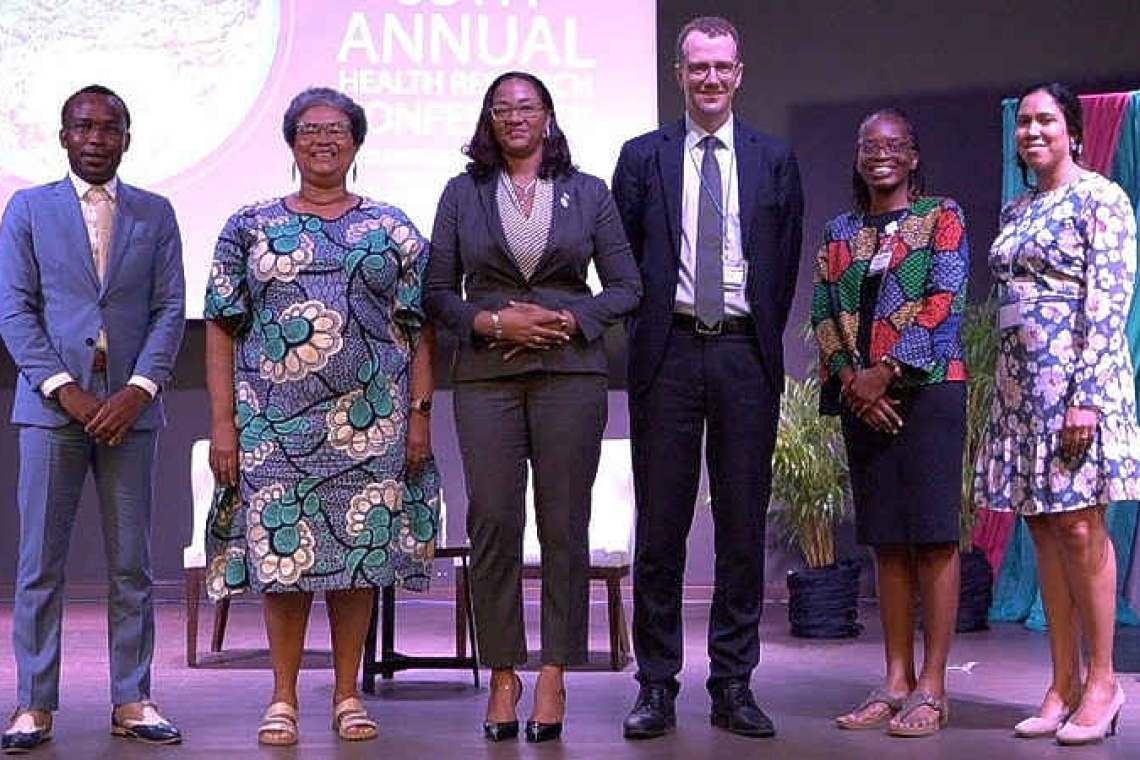From left: Callixtus Joseph, Implementation Agency for Crime and Security IMPACS; Dr. Joy St. John, Executive Director CARPHA; Dr. Sharon Belmar-George, Chief Medical Officer, Ministry of Health St. Lucia; Dr. Nicolas Florquin, Small Arms Survey; Dr. Natasha Sobers, George Alleyne Chronic Disease Research Centre, The UWI; and Marcia Garcia, Senior Policy and Research Liaison Officer, CARPHA.
CASTRIES, St. Lucia--Why do the types of weapons used in violence, and in particular firearms matter? What roles can the public health sector play in preventing firearms-related violence? How can different sectors including public health, security and research, better cooperate to prevent gun violence? What age group is impacted the most from gun violence? How does gun violence impact public health? How can data be used to implement policy recommendations in preventing and reducing firearm violence?
A panel discussion at the opening of the Caribbean Public Health Agency CARPHA 68th Annual Health Research Conference sought to explore these questions, according to a CARPHA press release. Titled “Aiming for Change: Firearms and Public Health Intersections”, the panel discussion offered diverse perspectives, shared information on the relationship between public health and firearm violence and fostered meaningful dialogue on the issues relevant to the theme of the conference.
The panel, moderated by Dr. Sharon Belmar-George, Chief Medical Officer, Ministry of Health, Wellness and Elderly Affairs St. Lucia, featured experts, each offering unique insights.
The panel included Dr. Nicolas Florquin, Small Arms Survey; Dr. Joy St. John, Executive Director CARPHA; Dr. Natasha Sobers, George Alleyne Chronic Disease Research Centre, The University of the West Indies (The UWI); and Callixtus Joseph, Implementation Agency for Crime and Security IMPACS, the release states.
Dr. Christophe Eick, Ambassador of the Federal Republic of Germany, in delivering his opening remarks, highlighted the importance of discussing firearm violence in the context of the high rates of violent crime in the Region, and its public health implications. Dr. Eick also acknowledged Germany’s support towards the “Pathway to Policy” project that creates synergies among the security, public health and research activities in the Region.
The event commenced with a keynote address by Dr. Terrence Drew, Prime Minister of St. Kitts and Nevis. “It is tragic to look at the effects of gun violence across the Region. The proliferation of firearms poses a grave threat to our societies, fuelling crime, exacerbating conflict and undermining the rule of law. With approximately 80% of homicides committed by firearms in many [Caribbean Community – Ed.] CARICOM Member States, it has led to devastating effects, creating a pervasive culture of fear, trauma and insecurity in our communities, and also at an individual level. As a regional leader, I believe it is our collective responsibility to take decisive action to address this crisis and ensure the safety and security of all our people.” He further stated that the conference is a “timely opportunity for us to recognise the importance of regional institutions collaborating to conduct research and partnering with Member States to inform the development of evidence-based anti-violence programmes/projects.”
The panellists provided an overview and main objectives of the “Pathway to Policy” project; discussed the risk of greater availability of powerful firearms/automatic weapons, which may result in more injuries and bystanders getting shot; and the specific vulnerabilities of young people as victims and perpetrators of firearms violence. The need to roll out injury surveillance systems that capture these problems on a real-time basis, and ensure this data serves to inform well-managed prevention programmes was also on the agenda, according to the release.
The panellists also addressed societal impacts and costs of firearms-related violence, and the diversion of scarce public resources this entails that could otherwise be invested in education and other health priorities; and provided insights into how data and analysis of the problem and risk and protective factors, currently feed into key regional initiatives.
The audience was reminded of the 2023 CARICOM Heads of Government declaration of crime and violence as a public health issue, in which they committed to measures that would empower and engage young people, support communities and victims, while simultaneously tackling the flows of illicit firearms, among other measures, the release states.
The project “Pathway to Policy: Integrating Security and Public Health Responses to Firearms Trafficking and Violence in the Caribbean” aims to enhance the regional integration of the security and public health responses to firearms trafficking and violence, and to create and support an effective pathway from regionally grown research to evidence-based policymaking. The project is being implemented by the Small Arms Survey together with CARICOM IMPACS, CARPHA and the George Alleyne Chronic Disease Research Centre at The UWI (GACDRC).
More information about the 2024 conference can be found at







